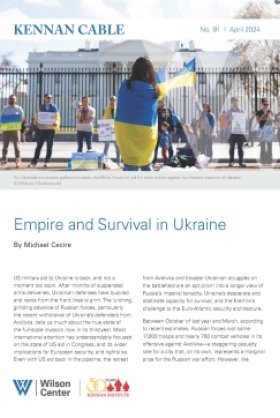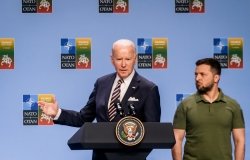Throw the Bums Out
"It may be that Congress votes down whatever authorization makes it to the floor; it may be that members pass a measure that’s too narrow, or too broad, or too incoherent... But if we wage a duck-and-run operation, executed by half measures, our nation and our Constitution lose," writes Jane Harman.
At the beginning of each of my nine terms in Congress, I pledged to support and defend the Constitution of the United States – without purpose of evasion. And I understood that Article I, Section 8 of the Constitution invested in the legislative branch the power to declare war. This is a core responsibility of members—probably the most solemn one that any of us carries—and though I made some wrong calls, I never ducked.
I can’t say the same about our current Congress. Today both parties are running, more or less en masse, from the duty to vote on an authorization and framework for what is already a seven-month-old war in Iraq and Syria.
In case you missed the movie, American aircraft have been dropping smart bombs on the Islamic State of Iraq and the Levant (ISIL) since August – about 10,200 so far. Those munitions have killed thousands of militants, the Pentagon says; thankfully, the jihadists have yet to kill any of our men and women in uniform, though no one should forget the savage murders of American journalists and aid workers captured by the group. Let’s be very clear. Our neighbors and friends, our sons and daughters, have been deployed into harm’s way for months – and Congress has yet to pass a war authorization.
I hope voters are noticing. This debate has some heroes—lawmakers like Sens. Bob Corker (R-Tenn.) and Tim Kaine (D-Va.) or Reps. Adam Schiff (D-Calif.) and Ed Royce (R-Calif.) —who are using their public platform to force the subject onto the Congressional agenda. All deserve enormous credit for embracing a discussion that most members have eyed like an electrified third rail. But on this as on every issue, constituents have the most leverage over their representatives. As long as the cliché that foreign policy doesn’t motivate voters endures, as long as voters aren’t mad as hell and loud about it, we’ll have no vote on an AUMF – and America’s influence abroad will suffer.
Right now, the president is running the anti-ISIL campaign off a strained combination of the 2001 Authorization for Use of Military Force against Terrorists, the 2002 Authorization for Use of Military Force against Iraq (which Obama himself declared obsolete), and his Commander-in-Chief authorities. I voted for both authorizations; my votes did not authorize this operation. The 534 Members who supported the 2001 measure thought it was limited in time and scope, and that it specifically targeted those who attacked us on September 11th. That’s what the plain text of the law says. But instead, that zombie authorization has been the basis for virtually every counterterrorism action taken by both President George W. Bush and President Obama. No serious lawyer and few in Congress find this satisfactory. Meanwhile, with the AUMF debate stagnating on the Hill, we have no good vehicle for a national conversation on the stakes, the costs, and why intervention merits paying them.
So what can be done? Here are some action items for voters, members, and the president. First, the phone lines and e-mail inboxes of every Congressional office should be jammed and sparking with messages from citizens who have loved ones fighting ISIL. Thousands of Americans, from every branch of our military, are directly engaged in this operation; tens of thousands more count those troops as friends and family members. I don’t believe for a second that Congress could shrug off their calls for a vote – if they organize and grab a bullhorn.
Next, Congressional champions of the debate should get creative. It looks increasingly unlikely that a standalone war authorization will get a vote; that means lawmakers invested in this issue need to look for alternative venues for this debate. It’s gotten tragically common for controversial legislation to be tacked onto unrelated bills as an amendment – but on an issue this crucial and this neglected, I wouldn’t gainsay anyone who starts attaching AUMF language to every bill that comes to the floor. Congress has also often used the appropriations power to weigh in on waging war; AUMF advocates should be huddling over that option too. And if all else fails, legislators should take this show on the road, stumping for a responsible vote wherever they can find a podium.
The nation’s biggest bully pulpit belongs to the president, and he should use it here. The draft he submitted to Congress was an effort to please a large, bipartisan majority; sadly, it pleased no one. So why not try again? Rather than compromise with himself, the president should put forward the bill that he genuinely believes is the best for our country’s security. If he holds true to his own past statements, that will include a repeal of the 2002 Iraq AUMF and a repeal or revision of the 2001 law. But at the very least, for the good of the troops under his command and the good of his own office, President Obama should be deeply invested in seeing a considered AUMF pass Congress.
It may be that Congress votes down whatever authorization makes it to the floor; it may be that members pass a measure that’s too narrow, or too broad, or too incoherent. It’s happened before.
But those concerns are no excuse for the silence on the Hill. American strength will be credible and effective with the country strongly behind it. But if we wage a duck-and-run operation, executed by half measures, our nation and our Constitution lose.
The opinions expressed here are solely those of the author.
About the Author

Jane Harman
Jane Harman, Distinguished Fellow and President Emerita, Wilson Center, is an internationally recognized authority on U.S. and global security issues, foreign relations and lawmaking. A native of Los Angeles and a public-school graduate, she went on to become a nine-term member of Congress, serving decades on the major security committees in the House of Representatives. Drawing upon a career that has included service as President Carter’s Secretary of the Cabinet and hundreds of diplomatic missions to foreign countries, Harman holds posts on nearly a dozen governmental and non-governmental advisory boards and commissions.
Read More







